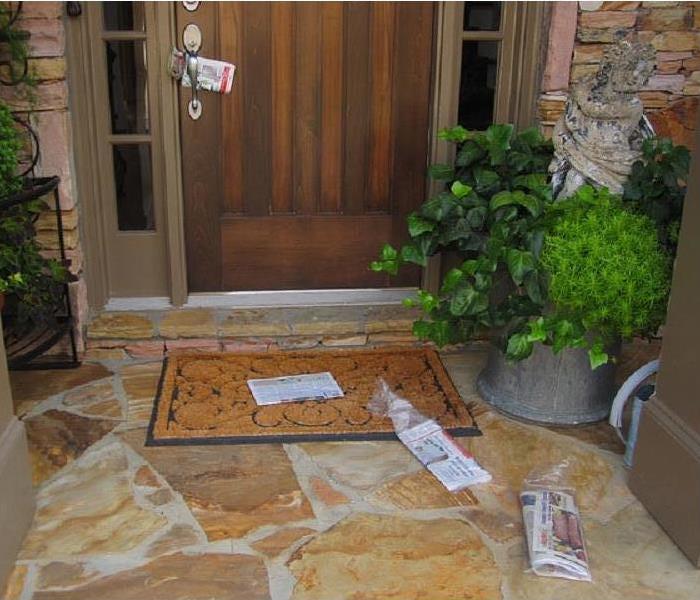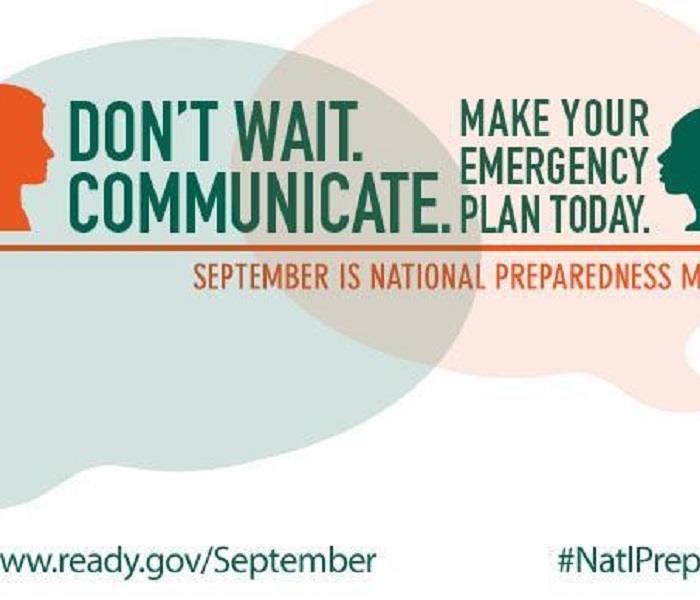Protect Your Home When You're On Vacation!
6/7/2017 (Permalink)

Are you leaving home for vacation? Here are a few tips to ensure your home is secure and your possessions are safe when you return. 1. Hire A House Sitter - Combined with a pet sitter, it can save kennel fees and a house sitter will be able to take care of many of the tasks mentioned here. 2. Stop The Mail - If you are going to be gone for longer than three days request that the local U.S. Postal Service hold your mail delivery until you return. 3. Stop Newspaper Delivery - Make sure you stop the service when you leave on vacation. Have a neighbor double check. Also beware of advertising circulars or packages that are left in driveways or at front doors. ?4. Arrange For Lawn Care - Don’t let uncut grass or untrimmed bushes make your home look neglected. Hire someone to do these chores in your absence. 5. Put Out The Trash Cans On The Designated Day – Have someone pull out your cans on trash day - and even put garbage in them to make it more realistic. Don’t leave cans out for the entire time you are gone. 6. Have Your Home Look Lived In - Invest in timers to turn lights on and off. Ask a neighbor or friend to park their car in the driveway for a few hours each day 7. Don’t Tell The World Your Plans - Talk about it and post pictures when you come back – don’t let a photo reflect that you are 500 miles from home. 8. Install Added Security Features - A home security system, surveillance cameras, exterior motion lights, and smoke detectors work whether you are home or not. 9. Unplug Your Electronics - Disconnect power to your most frequently used electronics: computer, coffeepot, television, and chargers. 10. Protect Your Pipes to Avoid Water Damage - Consider completely turning off the water supply if no one will be in the home for an extended period of time. If your home is heated by an older steam heating system, consult with your heating professional to determine if it is safe to turn off the water supply for your particular heating system. Also, if your home is protected by a fire sprinkler system, do not turn off the water to this system. 11. Put Valuables In A Safe Deposit Box - Prevent the worst case scenario if your home is robbed when you are gone. Take jewelry and other valuables and secure them in a safe deposit box. 12. Don’t Leave Spare Keys Outdoors - Collect any hidden spare keys from under the mat or potted plants. Burglars know the most popular hiding spots. 13. Tell the Neighbors - Let neighbors know when you are leaving and who they should expect to see (like a house sitter or landscaper) at your home. No matter what you do or precautions you take, it is still possible that something could happen while you are away. If this happens, it will probably not be a pleasant experience, but it hurts less if you are prepared ahead of time. You may want to go ahead and check your insurance policy and claim procedures before leaving. Create a home inventory and take lots of good quality pictures of everything in your house. This may take some time, but afterwards it is just a matter of keeping everything updated. Taking all of the precautions listed in this article will ensure that you have much less chance of a robbery or something bad happening while you are away. If the worst occurs, you will also be better prepared to deal with the situation.
Do You Have A Plan? September is National Preparedness Month
9/16/2016 (Permalink)
How quickly your company in Lincoln, NE can get back to business after a tornado, fire, or flood often depends on the emergency planning done today. The regular occurrence of natural disasters demonstrates the importance of being prepared for any emergency. The following are basic measures business owners and managers can take to begin preparing.
- Develop a Business Continuity Plan
Your organization's risk needs will vary depending on the specific industry, size, scope and location. Begin by reviewing your business process flow chart, if one exists, to identify operations critical to survival and recovery. Carefully assess your internal and external functions to determine which staff, materials, procedures and equipment are absolutely necessary to keep the business operating. You should also establish procedures for succession of management. - Review Insurance Coverage
Inadequate insurance coverage can lead to major financial loss if your business is damaged, destroyed or simply interrupted for a period of time. Insurance policies vary; check with your agent or provider about things such as physical losses, flood coverage and business interruption. Understand what your policy does and does not cover. - Prepare Your Emergency Plan
Your employees and co-workers are your business' most valuable asset. Communication is central before, during and after a disaster. Include emergency information in newsletters, on your company intranet, in periodic employee emails and/or other communication tools. - Practice the Emergency Plan
Some disasters will require employees to leave the workplace quickly. The ability to evacuate workers, customers and visitors effectively can save lives. If your business operates out of more than one location, establish evacuation procedures for each individual building. If your company is in a high-rise building, an industrial park, or even a small strip mall, it is important to coordinate and practice with other tenants or businesses to avoid confusion and potential gridlock. - Secure Your Facility and Equipment
Install fire extinguishers, smoke alarms and detectors in appropriate places. Secure all entry and exit points and plan for mail safety. Plan what you will do if your building, plant or store is not usable. Secure valuable equipment. Protecting your data and information systems may require specialized expertise, but even the smallest business can be better prepared. Use anti-virus software and keep it up-to-date. Don't open emails from unknown sources. Use hard-to-guess passwords. Protect your computer from intruders by using firewalls. Back up your computer data and download security protection updates known a patches regularly. - Emergency Ready Program (ERP)
In the event of an emergency, the SERVPRO Emergency READY Profile can help minimize business interruption by having an immediate plan of action in place for your facility. The ERP is a comprehensive document containing critical information about your business, including: emergency contact info., shut-off valve locations and priority areas. Knowing what to do and who to call in advance is key to quick response and timely mitigation. While each situation is unique, your organization in Lincoln, NE can be better prepared if you plan carefully, put emergency procedures in place, and practice for all kinds of emergencies. A commitment to begin planning today will help support your employees, customers, the community, local economy, and even the country. It also protects your business investment and gives your company a better chance for survival.





 24/7 Emergency Service
24/7 Emergency Service

